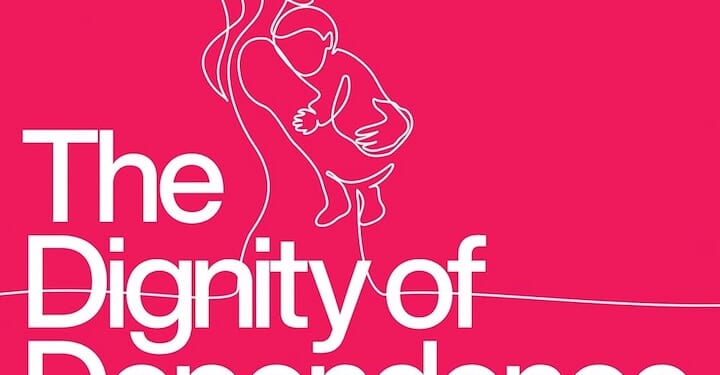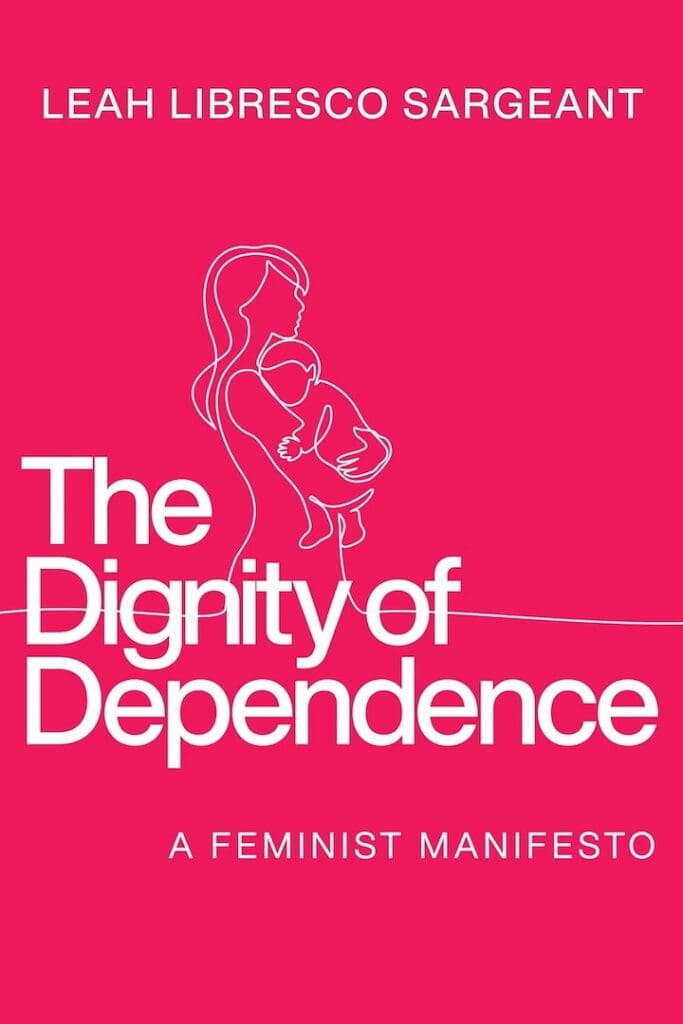The philosopher Alasdair MacIntyre, who died this past spring, is best remembered for his book After Virtue (1981). But his book Dependent, Rational Animals (1999) is a work of equal value. In it, he argued that dependence on others is hardwired into the human experience. We’re not interchangeable creatures. We have different strengths and weaknesses, skills and deficiencies. And our dependence is not a design flaw of our species, but a feature.
We were made to need each other. Our personal autonomy can grow with knowledge and experience. But it will always be limited. Thus, a just society is marked by a realistic understanding of each other’s different needs, and a generous, mutual self-giving to meet those needs.
MacIntyre appears in the bibliography of Leah Libresco Sargeant’s new book, The Dignity of Dependence. He’s referenced by name in the final pages. And for good reason: He’s a key resource among the many Sargeant uses to advance what she describes as a new “feminist manifesto.” That word “feminist” is not a slam-dunk positive for this reviewer. As a husband and father, I’m old enough to remember, in detail, the 1970s. That includes the subsequent course of mainstream, secular feminism and the wreckage it too often wrought.
Sargeant is different. She’s among a current wave of women scholars, writers, and leaders – from Erika Bachiochi and Abigail Favale to Terry Polakovic, co-founder of ENDOW, and many others – who offer a feminine critique of culture from a Christian-informed perspective. This opens the door to a wider receptive audience. And the author is skilled at her craft. The Dignity of Dependence is not just exhaustively researched; it’s also elegantly written and persuasively argued. It’s a pleasure to read. And while it is very much a “feminist” manifesto, it’s also the expression of a sane Christian humanism.
Sargeant’s page-one, opening sentences set the framework for her material: “The world is the wrong shape for women. I move through a world in which my body is an unexpected, unanticipated, somewhat unwelcome guest. It is as though women were a late, unanticipated arrival to a civilization that developed without them and their needs in mind.” That’s a sweeping and debatable claim. But if it sounds like the preamble to an anti-male grievance jamboree, the reader would be quite wrong.
For example:
When the world is the wrong shape for women, women will look for a range of techniques to solve or side-step their womanhood. Our culture is sometimes male-normed, but frequently the norm women are trying to match is simply an inhuman norm, one that neither men nor women can comfortably inhabit. Both men and women face pressure to regularize themselves, avoiding strong emotional or physical shifts, limiting the acute demands of caregiving, and working to widgetize themselves.
And this:
Equality for women is not the same as asserting interchangeability with men. . . .Recognizing and honoring the differences between men and women means putting dependence at the heart of our account of what it means to be human. Dependence marks women more obviously and intimately, but it is also impossible to tell the truth about men or treat them justly without accounting for our mutual dependence. No just society can be built on the basis of a false anthropology.
And finally this:
It is not good for woman or man to be alone, and more than that, it is not possible for man or woman to be truly alone. To treat each other justly, we must be honest about who we are. Men and women are deeply dependent creatures. We cannot build a just society on a false anthropology. We cannot have a feminism that does not begin with recognizing and rejoicing in the embodied difference between men and women.
The passages above can’t do justice to a text that’s both intellectually rich and accessible to any interested reader. Sargeant’s chapters on “Helping Women Be Better Men” and “The Incredible Shrinking Woman” outline in practical detail the challenges posed to women by a society structurally biased against the embodied realities of being female.
The someday prospect of artificial wombs, she writes, is offered as a kind of “reproductive justice,” relieving women of the burden of pregnancy – the better to guide them into the workforce. But “we dream of external wombs because it feels more possible,” in a mechanistic, tech-heavy culture, “to create biological support for a child in the absence of a mother than to win the social support to sustain the presence of a mother.”
Sargeant’s chapters “Illegal to Care,” “The Blessings of Burdens,” and “The School of Love” are especially strong. They’ll resonate with anyone who has a child with special needs (as my wife and I do), but also well beyond that community. As the author drives home again and again, there’s something wrong, and subtly anti-human, in the way modern society thinks about and structures the world. In effect, it’s filled with “hostile designs [aimed] to displace the needy without worrying too much about where they go instead.”
Before ending, I’ll mention the one (modest) reservation I have about this absorbing work. The world may arguably have “the wrong shape for women,” but the author understates the considerable soft power women do, so often and so effortlessly, project.
I speak from experience. One of my mentors was Andrée Emery, student of Anna Freud, the psychotherapist, co-founder of the American edition of the theological journal Communio, a friend of Balthasar and Ratzinger, and foundress of the Our Lady of the Way secular institute in the United States. She was a woman of supreme kindness, intellect, and grace. And also formidable. In a conversation about the role of the sexes four decades ago, she informed me – non-negotiably – that America might seem like a patriarchy, but it was really the “land of mama’s boys” and a disguised matriarchy.
I was a prudent young man. I didn’t argue.












